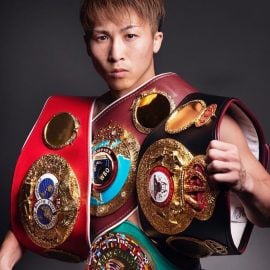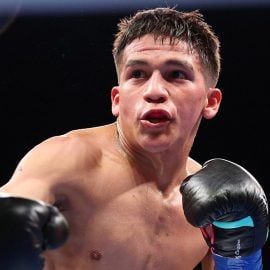James Madio proves he was born to play Willie Pep in The Featherweight

Premiere night in New York City. For filmmakers, it’s the make-or-break time. But for actor James Madio, the only person whose opinion mattered was his father, Gerard. And when The Featherweight ran its final credits, dad approved.
“Jimmy boy, you might have something here,” father said to son. “You did great.”
“That’s his approval,” laughed Madio, satisfied that, yes, he did a great job with the film that’s in select theaters this week. “At the end of the screening, the first thing I said when I got up for the Q&A was I had him stand and I thanked him from the bottom of my heart, and they gave him a standing ovation in honoring him. And he humbly, sort of sheepishly, just waved and sat down. But he’s very proud of it. And without him pushing me, this would’ve never happened for all of us.”
This isn’t a son thanking his dad for being in his corner over the years. Literally, without Gerard Madio, we never would have seen a film that deserves Oscar buzz across the board for its portrayal of legendary featherweight champion Willie Pep. Because he was the one that showed his son a photo of Pep years ago and said that this was the role he was born to play.
“My father’s an old-school Italian guy, always worried about my career,” James recalled. “His son’s in an industry that is not structured or doesn’t bring stability and cannot bring longevity, as well, depending on what you’re doing. So he always worried – ‘What are you doing? How’s things working?’ And then one day, I was in California, and he said, ‘Jimmy boy, you got to look up this fighter. He’s amazing. Willie Pep. He looks just like you, you should do his movie.’ And I don’t want to say I brushed him off, but I was like, ‘Yeah, I’ll look into it. I got a lot of things going on. I can’t start trying to produce a new movie right now.”

Willie Pep, circa 1955. (Photo by Stanley Weston/Getty Images)
Out of respect to his dad, Madio looked Pep up, printed out a picture of “The Will ‘o the Wisp” and put it on a board above his desk.
Enter screenwriter and friend Steve Loff, a fellow New Yorker (Madio is from The Bronx) who had been living out in Los Angeles. He visited Madio and saw the Pep picture.
“I’m a casual boxing fan, maybe even a little above that,” said Loff. “I love the sport, I follow all the big fights and fighters, and I’m just like, ‘Who’s that?’ And he goes, ‘That’s Willie Pep.’ And I had heard of Willie Pep being a young kid in Brooklyn, but I didn’t know a lot about him. He’s like, ‘Yeah, that’s Willie Pep. He’s got the most wins in boxing history. And my dad said that’s the role I was born to play someday. I want to make a movie about it.’ He just keeps walking and talking, and I’m like, ‘Hey, I’m out here. Let me help you make this movie.’ And that’s when it started.”
Loff remembers that this conversation took place in February of 2008, and by the time cameras started rolling on The Featherweight, it was November of 2021.

Madio’s physical resemblance to Pep is striking, but he also nails him on a human level. (Photo courtesy of Pep Films, LLC)
“That’s 13 and a half years,” he said. “And then we premiered at Venice in September. I think it was September third, 2023. That’s almost 15 and a half years after. Fifteen and a half years of me saying, ‘Hey Jim, who’s this guy on your bulletin board?’ And now we’re coming out in theaters a year after that. So we’re 16-plus years to this theatrical release of The Featherweight.”
That’s a lot of years to do anything, but let’s face it, Hollywood was probably not beating down the door for a Willie Pep biopic, especially one that portrays him in the time leading up to his 1965 comeback. This isn’t a feel-good, the good guy wins the big fight at the end of the movie film. Done in a documentary style, it feels as real as it can get. The boxing scenes, which are interspersed with real footage from Pep’s fights, aren’t the usual “guy takes 100 unanswered shots to the head, then comes back with a haymaker to win the fight” takes on the fight game. It’s gritty, and it portrays boxing the way it really is. That authenticity is clear from start to finish, and maybe Hollywood doesn’t want something that doesn’t feel like The Avengers. Whatever the case was, Madio and Loff were determined to get the film made.
“At some point in anything in life, you realize you’re going to fail and you cut your losses, right?” said Loff. “But I always believed if we could get it done, it was going to be a beautiful film. I also always believed if we could get it done, this was the role that Jim’s father told him he was born to play. I believed Jim’s father was right. He was born to play this role.”

Madio and Steve Loff on day one of production. (Photo courtesy of Steve Loff)
All along, the duo remembered the phrase Pep always signed his autographs with: “Keep Punching.”
“When we had a setback, we were like, ‘Okay, we got to keep punching,’” said Loff. “So I kept that in my head. Also, this is crazy … February 11th, 1949, he beats Sandy Saddler to regain his title. It’s the greatest win of his career. He was the first featherweight to ever regain a lost title in the history of the sport. So 2/11 is his greatest fight and a number I always had in my head.
“I go to meet Billy Papaleo, Pep’s son, for the first time in my life, many, many years ago. Billy passed away about a year ago, maybe less. He had cancer and was like 76, 77. He was my closest link to Willie. And we got close over the years. He was heroin addicted, as you see in the film, and he struggled with that his whole life. But the point is, I go to see him for the first time and his apartment number in his complex is Apartment 211. You can’t make that shit up. Every time I thought, okay, we got to pack it in, we’re not going to make this movie, I saw 211, whether it was on the clock, whether it was a highway number out of state or wherever. I’d be walking down the street and say, ‘Fuck this movie.’ And I look up and I’m standing outside 211. I swear to you, I don’t believe in stuff like that, but then I do.”
Loff laughs, and he can do that, now that the film is out in the universe. But it took a little more intervention to get over the finish line from an unlikely source. An old co-star of Madio’s named Leonardo DiCaprio.
“One day, after six, seven years of trying to get this made, I was just in one of those moods in the morning of ‘what the fuck am I doing?’” recalled Madio. “And I sent a message to Leonardo DiCaprio, who was my buddy, and I was like, ‘Leo, I never broke your balls about anything in my life. Never asked you for anything. What do you think about this story?’ And he never got back to me. But his company got back to me in less than 60 seconds. So, he must have forwarded my message right then and there to Michael Hampton at Appian Way. And I got a message from Appian Way, kind of going, ‘Leo just sent me a message, tell us about this film.’ And they were on board as producers.”
Also jumping on board was Steve James, known for his seminal documentary Hoop Dreams, and rising star director Robert Kolodny, and finally, there was a film.
And what a film it is. From top to bottom, the cast, which includes Ruby Wolf as Pep’s wife, Linda; Keir Gilchrist as Pep’s son, Billy; and Ron Livingston as his manager, Bob Kaplan; is brilliant, and Madio deserves Oscar consideration for his portrayal of Pep, because he took someone who was a superhero to so many and showed the human side, warts and all. Again, it’s not pretty, but it’s the reality for so many boxers, past, present and future.
“[Pep’s] thing was ‘first your legs go, then your friends go, then your money goes,’” said Madio. “He’s got to borrow money from someone, he’s got to get back in the ring, and you want this guy to see people at a restaurant where he eats. He’s got to save face here. I know this as an actor. Even when I didn’t have a good year or a down year, I still got to walk around. I’m good at what I do and I’m doing well and I still got it, even though I’m like, ‘Shit, I’m struggling.’ Willie had to do that on such a higher level, a champion of the world-type level when he walked in a room. And if you think about Willie, Willie was a winner inside that ring, a complete and utter winner, an assassin to a degree with his mastery in defense and his footwork. But outside the ring, he lost everything. All the wives that he lost, all the houses, he lost his relationships with his family. The contrast of that is so stark. And that’s how boxers are going to relate to it, I think. At least, I hope.”

Madio as Willie Pep in The Featherweight. (Photo courtesy of Pep Films, LLC)
They will. And they’ll also see someone that, by the end of the film, is Willie Pep. Of course, as a perfectionist, Madio wondered if he hit his mark, but I’ll unequivocally say that he did.
“Well, the first reaction is, as an actor you are always trying to do better and wonder what you could have done better and how the audience is going to perceive you,” Madio said. “And we’re talking about a monumental guy who’s in the spotlight. There’s plenty of footage on him, people know him, so, for me, the initial reaction was, ‘Could I have done better? Could I have done better with my presentation of Willie, with the way he spoke, his cadence, the character of Willie, could I have done better with the boxing?’
“ The guy was so damn special in the ring. How do you emulate that? I’m not trying to do my style. If you put James Madio in the ring, I’m pushing you up against the ropes and I’m pounding you like the old-school Italian, Mexican types – hit you like a brick and chop you down – and Willie’s the complete opposite to my instinct. So, the boxing meant a lot to me. The way Willie worked the room meant a lot to me. So I was super-focused on that. But my initial reaction was, ‘Did I do enough, and can I be better?’ And then after that settles in, you kind of tell yourself, ‘It’s good, man. You did it. You made the Willie Pep movie after a decade. You made the Willie Pep movie and you did good.’ And everybody involved all did a great job to get lightning in a bottle. That’s what it takes to make a good independent film is lightning in the bottle. And that’s what that was.”














